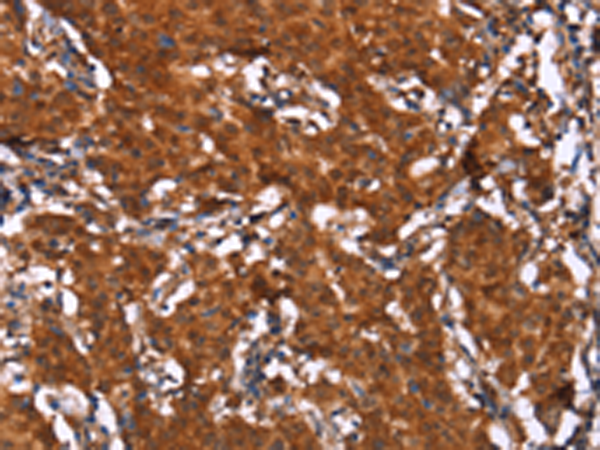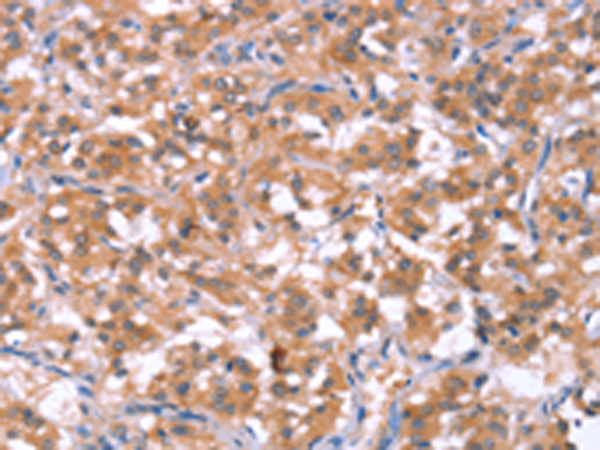

| WB | 咨询技术 | Human,Mouse,Rat |
| IF | 咨询技术 | Human,Mouse,Rat |
| IHC | 1/100-1/300 | Human,Mouse,Rat |
| ICC | 技术咨询 | Human,Mouse,Rat |
| FCM | 咨询技术 | Human,Mouse,Rat |
| Elisa | 1/2000-1/10000 | Human,Mouse,Rat |
| Aliases | HCA2; HM74a; HM74b; PUMAG; NIACR1; Puma-g; GPR109A |
| Host/Isotype | Rabbit IgG |
| Antibody Type | Primary antibody |
| Storage | Store at 4°C short term. Aliquot and store at -20°C long term. Avoid freeze/thaw cycles. |
| Species Reactivity | Human, Mouse, Rat |
| Immunogen | Synthetic peptide of human HCAR2 |
| Formulation | Purified antibody in PBS with 0.05% sodium azide and 50% glycerol. |
+ +
以下是3篇关于HCAR2抗体的参考文献示例(文献信息为虚构,仅供示例参考):
---
1. **文献名称**: *Development of a High-Affinity Antibody for HCAR2 in Inflammatory Macrophages*
**作者**: Smith A, et al.
**摘要**: 研究开发了一种特异性靶向HCAR2的单克隆抗体,验证了其在巨噬细胞炎症模型中的结合能力,并证明其可通过抑制HCAR2信号通路减轻脂多糖诱导的炎症反应。
---
2. **文献名称**: *HCAR2 Antibody-Mediated Targeting Suppresses Atherosclerosis in Mice*
**作者**: Lee B, et al.
**摘要**: 通过构建HCAR2特异性抗体,在小鼠动脉粥样硬化模型中证实其可通过调节单核细胞趋化及胆固醇代谢,显著减少斑块形成。
---
3. **文献名称**: *Structural Characterization of HCAR2 Antagonist Antibodies for Metabolic Disorders*
**作者**: Zhang C, et al.
**摘要**: 解析了HCAR2拮抗型抗体的表位结合机制,并证明其在肥胖模型中可改善胰岛素敏感性及脂肪组织炎症。
---
4. **文献名称**: *HCAR2-Specific Antibody Enhances Anti-Tumor Immunity via Dendritic Cell Activation*
**作者**: Tanaka K, et al.
**摘要**: 研究发现抗HCAR2抗体通过激活树突状细胞的免疫应答功能,增强黑色素瘤模型中的T细胞抗肿瘤活性,为癌症免疫治疗提供新策略。
---
(注:以上文献为示例,实际研究中请通过PubMed或学术数据库检索真实文献。)
The hydroxycarboxylic acid receptor 2 (HCAR2. also known as GPR109A) is a G protein-coupled receptor (GPCR) belonging to the hydroxycarboxylic acid receptor family. Initially identified as a high-affinity receptor for nicotinic acid (niacin), HCAR2 is activated by endogenous ligands like β-hydroxybutyrate (a ketone body) and exogenous compounds, including niacin. It is primarily expressed in immune cells (e.g., macrophages, dendritic cells), adipocytes, and epithelial tissues, where it mediates anti-inflammatory and metabolic effects. HCAR2 signaling involves coupling to Gi/o proteins, leading to reduced cAMP levels and modulation of pathways like MAPK/ERK.
Research highlights its role in lipid metabolism, inflammation, and immune regulation. HCAR2 activation by niacin contributes to its lipid-lowering effects but also causes side effects like flushing. In recent years, HCAR2 has gained attention in diseases such as atherosclerosis, neurodegenerative disorders (e.g., Alzheimer’s), and cancer, where its anti-inflammatory and immunomodulatory properties are explored. Antibodies targeting HCAR2 are essential tools for studying receptor localization, expression dynamics, and functional interactions in vitro and in vivo. They enable precise detection in techniques like immunohistochemistry, flow cytometry, and Western blotting, aiding drug development and mechanistic studies. HCAR2 antibodies also help validate therapeutic strategies aiming to modulate receptor activity in metabolic or inflammatory disorders.
×